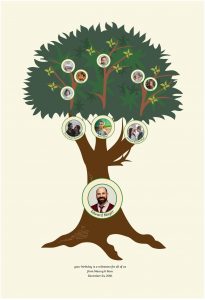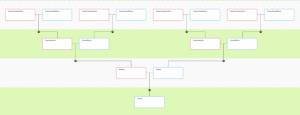Journaling as a Way to Preserve Family History

Even the best of us sometimes struggle to stay organized. For many people, 24 hours just isn’t enough to cater to all their life needs. So if you broach the idea of keeping a journal, it just seems impractical for many. It sounds like one more task to add to a never-ending list. To a lot of people, the whole idea just seems pointless. Many are at a loss to even think of what to write in a journal.
From a family history perspective, keeping a writing journal is a fantastic idea. With the right approach, the task stops looking like a chore. You won’t be agonizing over how to write a journal, or what to include in it. The ideas in this article should help set you on your way to journaling an important part of your family history book.
What is journaling

Journaling is keeping some sort of record of your daily life. This might take many different forms. You could do it using digital media, or the old school traditional way, with good old pen and paper. Journaling could be done using a calendar, making entries in an actual journal, you could go with a diary – combining plans and journal entries, or a scrapbook of some kind. Whatever you go with, the idea is to document your daily life in some form.
Benefits of journaling
People have found that journaling brings significant benefits. It is not just an academic task of committing events to paper. There is a therapeutic, cathartic effect that writing down one’s thoughts and experiences brings. It’s no wonder then, that the practice has been reporting to help people struggling with different mental and emotional challenges. And even for those who are not, it has been said to improve things like confidence, help deal with day-to-day stresses, and even improve memory.
Beyond those personal benefits, journaling is invaluable in the process of documenting your family history. Here are a few ways in which it can be essential:
Trace family history

Every individual is part of the jigsaw puzzle that is their family tree. Without their story, their family’s picture just isn’t complete. Unless you are powerful or famous, it is quite unlikely that your story will be documented. Someone therefore has to take the initiative. And even then, without your input, details that only you and a select few are privy to will remain undisclosed. The best person, therefore, to help with your part of your family history is you. With time, memories fade, details become fuzzy. There are few better ways to keep those memories fresh than by recording them every day.
Telling untold family stories

Even with the advent of social media and an increasingly interconnected world. We don’t necessarily broadcast each event that happens to us. There are many personal struggles and events that we all go through that remain private, to be shared only with our close circles, or even no one at all. However, many of these things are still relevant in the context of your family history. By journaling, you ensure that the family stories stay alive.
Organizing information

Anyone who has ever attempted to write a biography understands just how much of a challenge it is to get the facts right. Over time, details can get muddied, get lost, or the information might become too much to untangle. By journaling, you automatically arrange the facts in a reliable chronological order. The task is thus reduced to determining what is relevant and what is not when the time comes to distill the information for posterity.
How to write a journal
Like any good habit, journaling can be a tough one to build. But there are a few tips that could help you get started.
Consistency is important. You want to pick a set time and duration that works for you. This should be a time that is free of distraction, and the length of time should be such that it does not become burdensome. It could be ten minutes, half an hour, or could vary depending on the day of the week. Up to you. During the writing process, it is important not to interrupt your flow. Write continuously and fix typos and sentences at the end of the allotted time.
If you keep at it and develop a schedule, you may just surprise yourself before long!
Journaling ideas to trace your family history
It’s one thing to develop the writing habit, but what about the content itself? What should you include, and how do you sift what is important and what’s not?
Here are a few ideas.
Describe family memories

Recounting family events that you’ve experienced may perhaps feel like rehashing old news. However, your own personal recollection of family events comes with a unique perspective that would be a refreshing view of the same event. For those that were not present when the event occurred, you offer them a first-hand account of what happened.
Fill in the family chart

A family chart is a great way to offer context to your journaling entries. Remember that your readers may come generations later. Giving them an introduction to the characters involved helps to clear up any ambiguities. It also serves the purpose of helping you stay consistent as you write and identify people. For example, you could use nicknames for people who share names, or identify their generations.
Add your family photos

It is incredible how many photographs of precious memories are locked away within one household. Much like personal recollections of events, photographs can provide a unique point of view of a memory shared by many. And for some, it may be the only image of times gone by. Adding your family photos breathes life into your family history and helps to illustrate it.
Add elements of scrapbooking

Your family history book layout doesn’t have to be that of a ponderous historical volume. Little bits of memorabilia add color to the story you are telling. Do not be afraid to add quirky little interesting details, childhood drawings, cutouts, photos, all add to the illustration of your story.
Conclusion
Apart from the personal benefits it brings to an individual, journaling has great value for your ancestral family history. For future generations, it solves the problem of how to trace family history especially when much of it is anecdotal. The process itself can be fun, therapeutic, and if you add different elements, like a family chart for example, you can help create some of untold value for your family.





